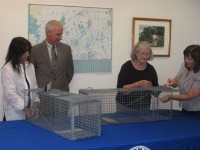Task Force to Help Reduce Feral Cat Population

The Health Department announced last week the development of a new program to trap, neuter, vaccinate and then release feral cats living in the wild.
Health department officials said the program is an attempt to address and curb the growing feral cat population which they said was of concern to public health.
That is because feral cats account for a significant number of rabies treatments, second only to bats, and more than racoons, skunks and fox combined.
Health Department Officials said the concept of “trap and neuter” is a human an effective approached used for decades across the United States after being proven effective in Europe.
The department said the practice improves the lives of feral cats, decreasing the size of colonies over time and improving their interactions with humans, whose homes they may live near to.
Working with volunteers from Putnam Felines, Inc., and area veterinarians, the county health department is forming a Feral Cat Task Force with the ultimate goal of decreasing the population of feral cats in our community over time and thereby reducing the risk of rabies
Cats not immunized against rabies may carry the virus and, in turn, the people who may feed or care for a stray or feral cat risk exposure to rabies through being bitten or scratched.
Very often, after scratching or biting a person, the cat will run off and then cannot be trapped and monitored for signs of rabies.
This makes it necessary for the person to undergo treatment for a possible, as opposed to a confirmed, rabies exposure.
The county health department said that through this effort to reduce the population, the possibility of area residents becoming exposed to rabies will be lessened.
For more information on this initiative, please contact Marianne Burdick, MPH, Public Health Protection Supervisor at 8450808-1390, ext. 43160.
